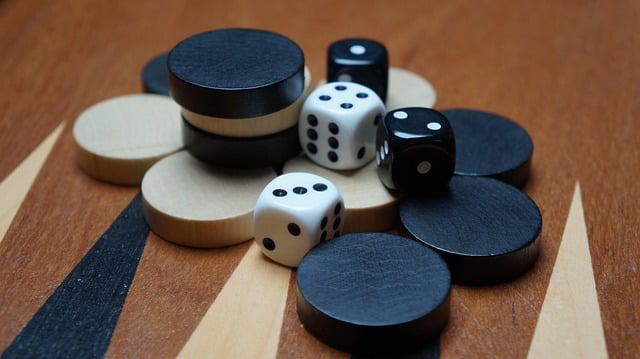That’s it,” Bilgrim said, glancing down at his phone, already planning his next activity.
“Not quite,” I replied.
Whoever bore off all their checkers first would win the game–and the tournament. We’d been playing for hours, hunched over an oversized backgammon board in a worn vinyl booth at Stanley’s Steak House. Outside, the sky had shifted from a soft pink to full darkness. It had been the closest of matches. Bilgrim would jump ahead, I’d double, then we’d be tied again.
Now, in this final game, we each had just two checkers left. His sat on the 3 and 1 points; mine on the 5 and 6. Thirty-five out of thirty-six dice combinations would give him the four points he needed. He rattled his cup and threw: 2-1. The only roll that didn’t work.
Only six dice combinations would let me bear off both checkers—if I didn’t roll one of them, he’d be the winner. “You have a chance now,” he said, as if I hadn’t noticed. He’d narrated our moves throughout the match –a tic I found incredibly annoying.
I nodded, barely breathing.
He set his phone face-down on the table, rubbing his hands together—finally paying attention.
I shook the dice, threw them across the board: double sixes.
“Good match.” Bilgrim said, reaching across the table.
“Good match,” I echoed, shaking his warm, sweaty palm. I was elated, but whoops and hollers aren’t part of the backgammon culture.
We silently packed up; checkers lined neatly in the case. Click. Closed.
“I’ll tell Alex,” I said, grabbing the score sheet and heading to the front of the restaurant.
Alex, the tournament director, sat hunched over his own board, deep in thought. His wispy gray ponytail brushed the collar of a wrinkled NEBC T-shirt.
“I won,” I told him. I felt like jumping up and down.
He glanced up, completed his move, and calmly reached for his black-framed glasses. After reviewing the score sheet, he said, “You’ve won the intermediates”
Only my second tournament with the New England Backgammon Club—and I’d earned $226.
“Congratulations,” he said, pulling the bills from a battered white envelope. I imagined seeing my name in the NEBC newsletter next week, printed in bold under “Winners.”.
As I left the restaurant, I was aware of the time and my buzzing phone—babysitter waiting, But before starting the car, I called my best friend. “I won!”
“That’s amazing. Did you meet any interesting men?” Joan was laser-focused on finding her next partner after a long uninspiring marriage. Her match.com date count was up to eighty.
“It was just the intermediates,” I deflected. The real talent competed in the open division. Our club included national champions–even a grandmaster. I pictured myself someday flying to the Las Vegas nationals, then on to the Cherry Blossom Open in D.C. Mastering backgammon felt challenging but doable, like buying my starter home and adopting my children.
I’ve always been someone who makes things happen—a mix of grit and good luck. And I really wanted to get good at backgammon.
At home, I practiced online whenever I had a spare half hour. My username was lizonthelam, a combination of my sister’s name and an attempt at humor.
“What are you on the lam from?” strangers asked in the chat.
“Nothing. Just life.” I’d write, as my children’s shrieks echoed from downstairs. They were loud and demanding. Adopted through social services, my children always seemed to be on high alert. Even asleep, they thrashed and screamed.
Being a single mother to two “spirited” children took its own kind of strategy. After dinner, I’d wipe the counters, then corral them on the couch with a bowl of popcorn and reruns of Charmed.
“Don’t make a mess,” I’d warn before bolting upstairs. Sometimes, I’m ashamed to admit, their bedtimes came and went, but I was too engrossed in a match to pull myself away from the computer. I’d hear them downstairs, laughing, and think, Well, at least they’re bonding.
The first Sunday of the month, the NEBC tournament took over Stanley’s. Every booth was filled—mostly with middle-aged men, some wearing windbreakers with club patches, others in polos tucked into belted jeans. They were bent over their boards in concentration or milling about half-watching whatever sports event was on TV, waiting for their next match to be called. It was the perfect hobby, Joan suggested, for a woman who wanted to “meet someone.” But these men weren’t my type. They were methodical, logical—”computer brains,” I called them, able to mentally calculate the probabilities of every move.
Months passed. I didn’t win another tournament, not even the consolation round. The worst mistakes are called blunders, and I made plenty of those.
In frustration, I asked Marty, the reigning club champion, if he gave lessons. We agreed to meet at a Starbucks halfway between our homes.
Marty had already set up his board—soft leather—tan and brown—with real ivory checkers when I arrived ten minutes late. He wore a wool pullover despite the warm day and nursed a hot chocolate. “I …I didn’t know if I should get you something.” He gestured towards the counter.
“I’m fine,” I said, eager not to waste another minute of this hundred-dollar hour.
We started playing. He was intent on teaching me to count pips, the method accomplished players used to calculate the exact number of rolls they needed to completely move their checkers off the board. First, I needed to calculate my pip count, then my opponent’s pip count, and tally the difference.
But I kept losing track–mental math was not my strong suit. “This is impossible,” I groaned. “I like to use my intuition. Does it seem like there are more black or white checkers on my side? Does my gut tell me I’m winning?”
He sighed, brushing a wild curl away from his pale, sweating brow. “Let’s try this again.,”
There are plenty of YouTube videos on backgammon strategy, shelffuls of books to study. I wasn’t abandoning my quest to improve my game. But that was my first and last lesson with Marty. I just couldn’t learn what he was teaching.
Three years ago, I was diagnosed with stage-four uterine cancer, I nearly quit backgammon. The NIH chart listed my five-year survival rate at seventeen percent. Every moment suddenly mattered. I did not want to be on my deathbed, regretting that I’d spent my final months playing games with strangers. I wanted to be with people I loved, outdoors, taking weekend trips, or at my desk, composing compelling health updates on CareBridge.
But I didn’t quit. Backgammon relaxed me. Clicking on the GridGammon icon felt like ordering a pastry in a quiet cafe. Sometimes it was the only thing I could focus on in my dull, chemo haze.
If backgammon teaches anything, it’s that even the most improbable rolls do happen. After treatment, my scans were clear. Recurrence odds dropped to “only” fifty percent. A manageable number. Although when it comes to deciding to double in a game, those odds are not high enough.
Recently, the scan showed that the cancer had returned—five spots in my lungs. I shouldn’t have been surprised, but I was.
“Chronic illness,” my doctor said—a gentle way of saying you won’t recover.
Now I’m living in uncertainty. Will this treatment work? How much time do I have? Backgammon is comforting. “Win once,” Marty told me, “and you can call it luck. Win consistently, and it’s because you know how to play.”
Backgammon has been my hobby, my obsession, and my distraction. My rating is still in the 1300s, the bottom third.. But after years of trying to be great, I’ve discovered that being so-so is good enough.
When I’m discouraged, I stay up late waiting for janethepain , a player in some faraway time zone. She doesn’t know I have cancer. I almost always beat her.
!@$%!@@ she writes when I hit her blot.
“You’re funny,” I reply.
Last night I played woodpecker, who’s rated much higher. But the dice were with me—double after double. “This is ridiculous,” he wrote, as three of his checkers landed on the bar. “This program makes lousy players look good.”
“Like you?” I shot back, unrepentant.
I’ve accepted that I’m never going to be a champion. But when I win, it still feels amazing.
***
***
The ManifestStation publishes content on various social media platforms many have sworn off. We do so for one reason: our understanding of the power of words. Our content is about what it means to be human, to be flawed, to be empathetic. In refusing to silence our writers on any platform, we also refuse to give in to those who would create an echo chamber of division, derision, and hate. Continue to follow us where you feel most comfortable, and we will continue to put the writing we believe in into the world.
***
Our friends at Corporeal Writing are reinventing the writing workshop one body at a time.
Check out their current online labs, and tell them we sent you!
***
We are looking for readers with an hour or so a week to read non-fiction submissions.
Interested? Let us know!
***
Inaction is not an option,
Silence is not a response
Check out our Resources and Readings


